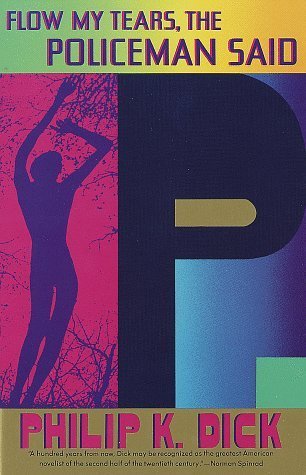
Flow My Tears, the Policeman Said
Book Description
A man wakes up in a world where he no longer exists, hunted by a society that’s forgotten him. As he navigates a surreal landscape teeming with paranoia and identity crisis, he finds allies and foes in unexpected places, each with their own motives. Shadows lurk around every corner while he grapples with the haunting question of what it means to be truly alive. In a society governed by surveillance and control, can he reclaim his identity before it slips away entirely? Discover the thrilling twists that unfold as his reality unravels—will anyone remember who he is?
Quick Book Summary
"Flow My Tears, the Policeman Said" by Philip K. Dick tells the story of Jason Taverner, a famous television host in a dystopian future America controlled by an oppressive police state. One morning, Taverner awakes to find that he has been erased from all records—no one remembers him, his identification is missing, and even his closest companions are unaware of his existence. As he desperately seeks to restore his identity, Taverner is thrust into a bewildering world of shifting realities, where nothing is as it seems and paranoia reigns. Dick crafts a haunting tale that explores the fragility of identity and fame, the power of authoritarian control, and the nature of reality itself, as Taverner navigates betrayals and unlikely alliances in his search for truth and self-affirmation.
Summary of Key Ideas
Table of Contents
The Fragility of Identity
Jason Taverner, a genetically enhanced television celebrity in a totalitarian America, leads a glamorous life until an inexplicable event strips him of his identity. After an altercation with a disgruntled lover, Taverner awakens in a parallel but strangely altered reality where he has never existed. His closest friends, colleagues, and the public have no memory of him, and he lacks all legal identification. This sudden erasure throws him into a desperate struggle to survive in a society obsessed with documentation and surveillance, where those without identity are swiftly detained or worse.
Paranoia and State Control
As Taverner attempts to navigate the labyrinthine bureaucracy, he encounters various figures willing to help him for their own reasons, including counterfeiters and outcasts similarly marginalized by the system. With the ever-present threat of police capture, particularly from Felix Buckman, a high-ranking and conflicted police official, Taverner must continuously adapt, creating fake IDs and assuming new roles. Paranoia mounts as he realizes that reality itself may be shifting, and he is forced to confront both the dangers of an oppressive regime and the weaknesses in his own sense of self.
Surreality and the Nature of Reality
Throughout his ordeal, Taverner grapples with isolation and existential uncertainty. His existence has always relied on external affirmation—fame, recognition, and the privileges of celebrity. Stripped of these, he faces profound alienation and psychological collapse. In his encounters with other fugitives and those on the fringes of society, he discovers the pervasive loneliness and vulnerability underlying human relationships in a world dominated by fear and suspicion. These explorations drive him toward a deeper understanding of what it means to truly belong.
Isolation and Yearning for Connection
Philip K. Dick interweaves the narrative with elements of unreality and hallucination, blurring the line between what is real and what is illusion. The story delves into themes of drug use, altered consciousness, and subjective experience, challenging both Taverner and the reader to question the very fabric of reality. As unreliability and ambiguity proliferate, the novel’s dystopian world becomes a nightmarish echo of modern anxieties.
The Limits of Power and Authority
Ultimately, "Flow My Tears, the Policeman Said" asks whether identity and one’s place in society are ever truly secure. Taverner’s journey reveals the limits of state power, suggesting that even in a world of perfect control, the human soul remains elusive and unpredictable. By the end, the book leaves open the possibility of redemption and self-acceptance, even in the face of all-consuming uncertainty and loss.
Download This Summary
Get a free PDF of this summary instantly — no email required.





